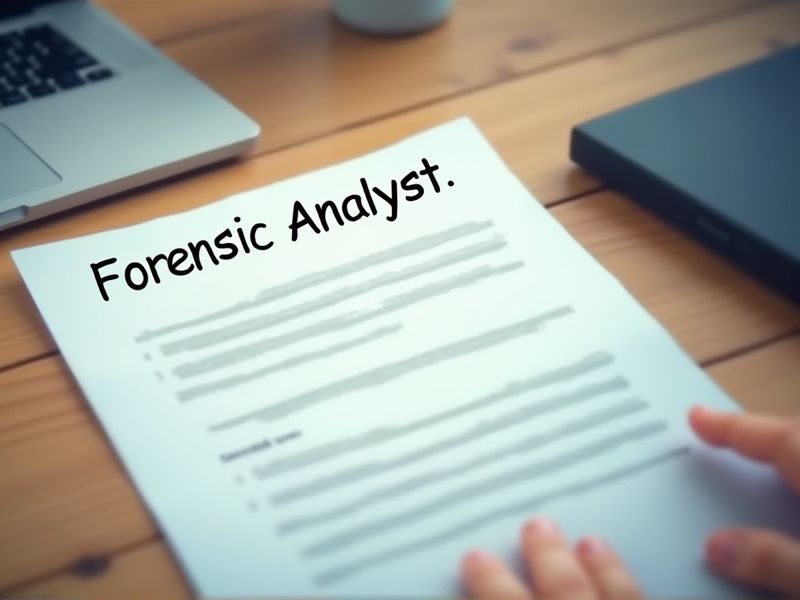
The role of a Forensic Analyst involves dissecting digital evidence to solve crimes and ensure justice. Only through certain certifications can an analyst assure skill in handling sensitive data securely and legally. These credentials not only validate an individual's expertise but also enhance credibility in a competitive field. Essential certifications for a Forensic Analyst are detailed here.
EnCase Certified Examiner (EnCE)
EnCase Certified Examiner (EnCE) certification is essential for a Forensic Analyst as it validates their expertise in using the EnCase software, a prominent tool in digital forensics for acquiring and analyzing digital evidence. Employers often require this certification to ensure professionals possess the technical proficiency needed to handle complex forensic investigations efficiently. Obtaining EnCE certification increases credibility and demonstrates commitment to ongoing professional development in the rapidly evolving field of cybersecurity. Forensic analysts with EnCE certification are better equipped to produce reliable and court-admissible results, which is crucial in legal proceedings.
Certified Computer Examiner (CCE)
The use of a Certified Computer Examiner (CCE) provides a structured methodology in digital forensic investigations, which leads to more reliable findings. Employers and clients recognize the CCE as a standard of competence, resulting in increased trust in a forensic analyst's work. The certification process ensures that the analyst stays updated on the latest tools and techniques, directly improving investigation quality. Courtroom credibility is enhanced when a forensic analyst holds the CCE, as it demonstrates adherence to accepted standards.
GIAC Certified Forensic Analyst (GCFA)
GIAC Certified Forensic Analyst (GCFA) is critical for a forensic analyst as it ensures they possess advanced skills in forensically analyzing complex digital incidents. Acquiring the GCFA certification demonstrates the analyst's ability to handle sophisticated cyber intrusion detection and incident response. Organizations require this certification to ensure accurate data recovery and interpretation during investigations, minimizing the risk of oversight. The certification also validates the analyst's proficiency in leveraging cutting-edge tools and techniques, improving the overall quality of forensic examinations.
GIAC Certified Forensic Examiner (GCFE)
The GCFE certification enhances a forensic analyst's credibility by validating their expertise in digital forensics and incident response. Employers are more likely to trust a professional with proven skills, which can lead to better job opportunities and higher salaries. The certification helps analysts stay updated with evolving threats and forensic technology, crucial for effective incident investigations. Possessing a GCFE ensures standardized knowledge and methodologies, leading to more accurate and reliable forensic analysis results.
Certified Forensic Computer Examiner (CFCE)
The increasing sophistication of cybercrimes necessitates the expertise of a Certified Forensic Computer Examiner (CFCE) to effectively gather and preserve digital evidence. This certification ensures that the forensic analyst understands the legal and technical aspects of digital investigations, reducing the risk of evidence contamination. The CFCE credential guarantees that analysts can accurately interpret complex datasets, which is crucial in solving cases. Courts require reliable testimony and reports, and the CFCE certification provides credibility and trust in the evidence presented.
Computer Hacking Forensic Investigator (CHFI)
Computer Hacking Forensic Investigators provide crucial skills in analyzing data breaches and cybercrimes, aiding forensic analysts in uncovering the origin and methods of an attack. Their expertise in retrieving and preserving electronic evidence ensures that collected data remains unaltered, which is critical for legal proceedings. By conducting in-depth investigations, CHFI professionals can reconstruct events, helping analysts understand the sequence and scope of security incidents. Their knowledge of various hacking techniques and digital forensic tools enables forensic analysts to identify vulnerabilities, thereby preventing future breaches.
Certified Information Systems Security Professional (CISSP)
CISSP certification equips a forensic analyst with advanced knowledge in areas such as access control, cryptography, and network security, which are crucial for conducting thorough and effective investigations. Understanding security protocols and systems helps in tracing intrusion sources and assessing the impact of security breaches, enhancing the quality of forensic analysis. A forensic analyst with CISSP credentials can more accurately interpret complex data and system logs, essential for building credible evidence. Organizations trust professionals with CISSP certification to uphold stringent security standards, making them preferred candidates for forensic roles.
CompTIA Security+
CompTIA Security+ provides foundational knowledge in security concepts, which is crucial for forensic analysts needing to understand and manage diverse cybersecurity threats. Forensic analysts often investigate breaches and analyze data to uncover vulnerabilities; Security+ equips them with the tools to identify and mitigate these weaknesses. The certification covers key areas such as access management and risk assessment, enabling analysts to conduct thorough investigations and reinforce security protocols. By emphasizing up-to-date security practices, Security+ ensures analysts stay informed about current cyber threats and defenses critical in forensic work.
AccessData Certified Examiner (ACE)
The AccessData Certified Examiner (ACE) certification is crucial for Forensic Analysts as it validates their proficiency in using AccessData suite tools, which are pivotal in digital investigations. The certification enhances credibility, ensuring clients and employers trust the analyst's technical capabilities. Having ACE certification increases job marketability, as many organizations prefer or require certified professionals for their digital forensics roles. As technology evolves, the certification demonstrates a commitment to staying updated with the latest forensic technologies and methodologies.
CompTIA Cybersecurity Analyst (CySA+)
The CompTIA Cybersecurity Analyst (CySA+) certification equips forensic analysts with a solid understanding of threat detection, allowing them to effectively identify and mitigate potential security breaches. This certification emphasizes behavior analytics, enhancing analysts' ability to trace cyber threats and decipher attacker strategies. By focusing on real-world applications, CySA+ ensures that forensic analysts can handle complex security incidents with practical solutions. The skill set acquired through this certification aligns with industry demands, ensuring forensic analysts remain relevant and effective in their roles.
Summary
By obtaining certifications, you as a forensic analyst can significantly enhance your specialized skills and knowledge in the field. Certifications often lead to increased credibility, making it easier for you to gain trust from clients and employers. With these qualifications, you might see better career advancement opportunities and an increase in potential earnings. Industry recognition from certifications can position you as a leader, impacting both personal and organizational success.
